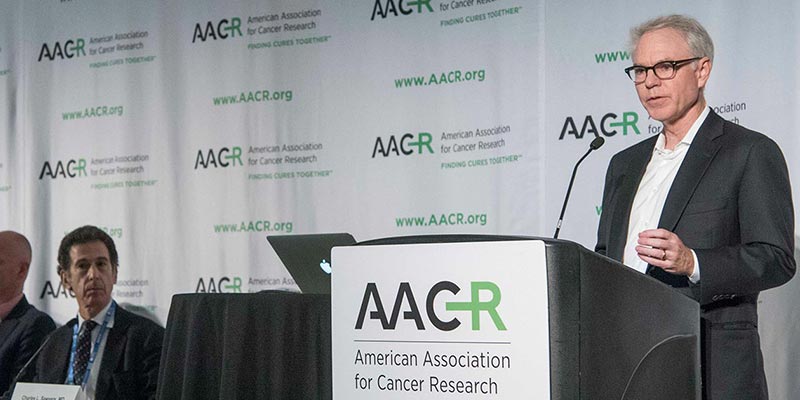
AACR Project GENIE: Delivering on the Promise of Precision Oncology
The AACR entered 2016 with a promise to catalyze clinical and translational cancer research through data sharing. As the leader of AACR Project Genomics Evidence Neoplasia Information Exchange (GENIE), the AACR forged a consortium of eight international institutions around an agreement to aggregate their genomic data and link it to clinical outcomes to advance cancer treatment. The year came to a close with the GENIE team delivering on that promise, sharing one of the largest fully public, real-world cancer genomic data sets ever released.
In November 2015, the AACR announced the launch of AACR Project GENIE, a multiphase, multiyear, international project formed to realize the promise of precision medicine to benefit cancer patients. As the founding organization and leader of GENIE, the AACR houses the Coordinating Center, which organizes and executes on all aspects of the project. The AACR also provided the seed funding to launch the project.
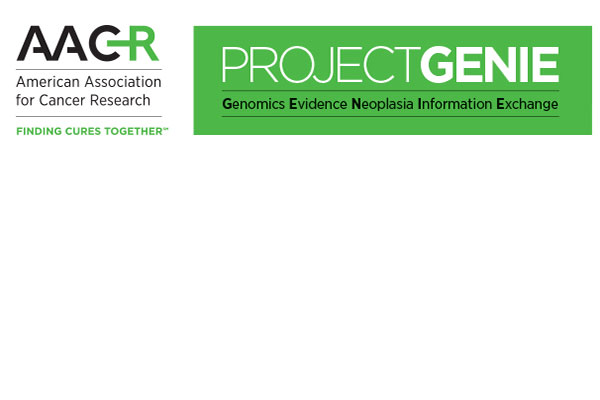
On January 5, 2017, a little more than a year after the launch of the project, the AACR made the first data release from the project public, as promised. These data consist of nearly 19,000 de-identified genomic records and the associated limited clinical data collected from patients who were treated at the eight participating institutions. The dataset covers 59 major cancer types, including data on more than 3,000 patients with lung cancer, 2,000 patients with breast cancer, and 2,000 patients with colorectal cancer. By making the data available to the global research community, AACR Project GENIE catalyzes new clinical cancer research in myriad ways, including but not limited to:
The release of this initial dataset is only a starting point. The dataset will be continuously expanded with regular data additions and public releases, and the project is now accepting applications for new participating centers—a year ahead of schedule. The project is also open to sponsored research requests to use the data to gather deeper clinical outcomes information on specific subsets of patients to make the connection between genotype and clinical phenotype. Moving forward, the AACR Project GENIE registry will provide a valuable tool to the cancer community, solving a multitude of clinical and research challenges and improving the lives of cancer patients.
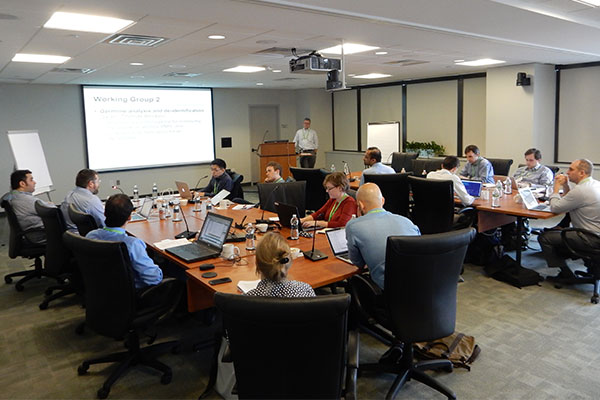
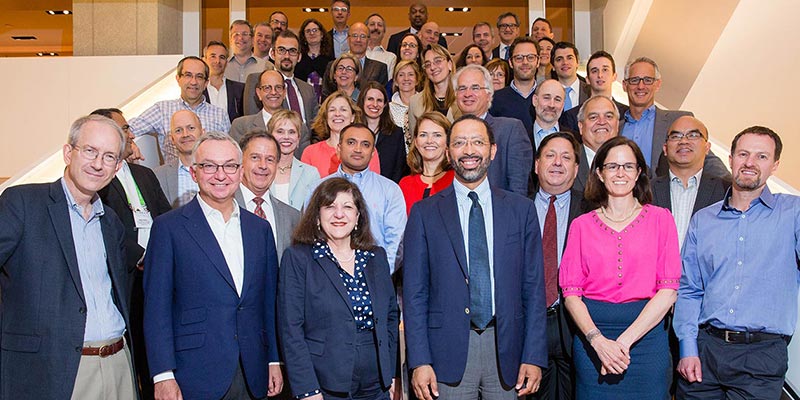
Scientific Leadership: Harnessing Knowledge, Forging Solutions
Solving the complexities of the cancer problem requires the concerted effort of a variety of groups. As the authoritative source and voice in the cancer community, the AACR brings these groups together—focusing their collective knowledge to accelerate the development of innovative cancer research.
AACR Cancer Prevention Summit: Shaping the Future of Cancer Prevention—A Road Map for Integrative Cancer Science and Public Health
Throughout its history, the AACR has advanced the frontiers of cancer prevention science in support of improved public health and the reduction of cancer incidence, morbidity, and mortality. In February 2016, to evaluate that history and set a course for future efforts, the AACR organized a Cancer Prevention Summit on “Shaping the Future of Cancer Prevention: A Road Map for Integrative Cancer Science and Public Health.” Chaired by Ernest T. Hawk, MD, MPH, and Scott M. Lippman, MD, the summit brought together nearly 70 scientists, clinicians, patient advocates, and funders. Over three days, the participants reviewed the current state of cancer prevention science; identified future research priorities in screening, early detection, and cancer intervention; developed a plan to optimize the AACR’s support of the prevention community; and defined the AACR’s role in advancing public policy and education in cancer prevention.
AACR Think Tank: Genomics in Clinical Medicine
While the sweeping insights yielded by genomic data have moved the promise of cancer precision medicine into the realm of possibility, logistical challenges hinder the translation of that promise into everyday oncology practice. To address these challenges and accelerate the application of precision medicine to the clinic, Past President José Baselga, MD, PhD, FAACR, convened an AACR Think Tank on Genomics in Clinical Medicine in July 2016.
As a trusted scientific partner, the AACR provided common ground for the discussion of coordinated and competing interests from key stakeholders including academic and industry scientists, clinicians, regulators, payers, and patient advocates. At the July meeting—the first stage of a multiyear project—the think tank identified the primary obstacles in cancer genomics in clinical medicine and recommended actionable first steps that the key players could take to overcome them. A report from this think tank is currently in preparation.
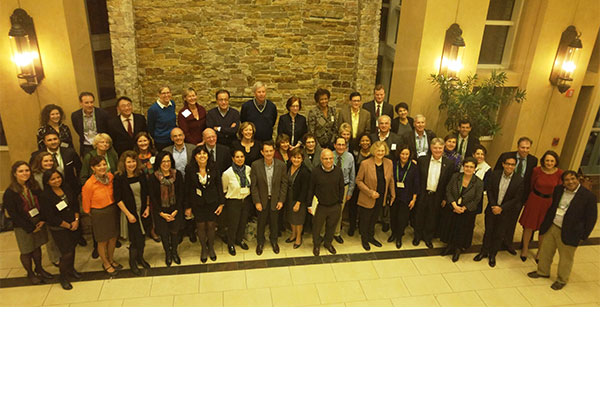
AACR Childhood Cancer Predisposition Workshop: Optimizing Pediatric Surveillance and Care through Precision Genetics
Through a number of programs—i.e., conferences, grants, task forces, and a pediatric cancer working group—the AACR has worked to establish childhood cancer research as a global priority. Those efforts included fostering the early detection and treatment of pediatric cancers in 2016, as the AACR gathered more than 50 pediatric cancer experts from around the world for a three-day workshop in October. Under the leadership of Chairs Garrett M. Brodeur, MD, and David Malkin, MD, the workshop participants developed clinical surveillance recommendations for childhood cancer predisposition syndromes.
Like all AACR initiatives, this workshop established a foundation for future action. After the publication of their pediatric cancer surveillance recommendations in the AACR journal Clinical Cancer Research, workshop participants will pursue the formation of a working group subcommittee to develop collaboration opportunities that will further advance research on pediatric cancer predisposition and risk.
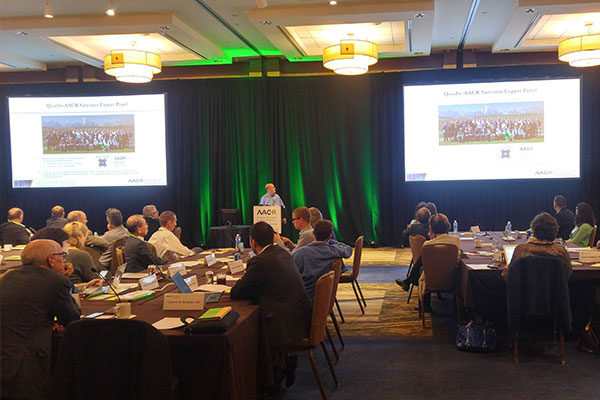
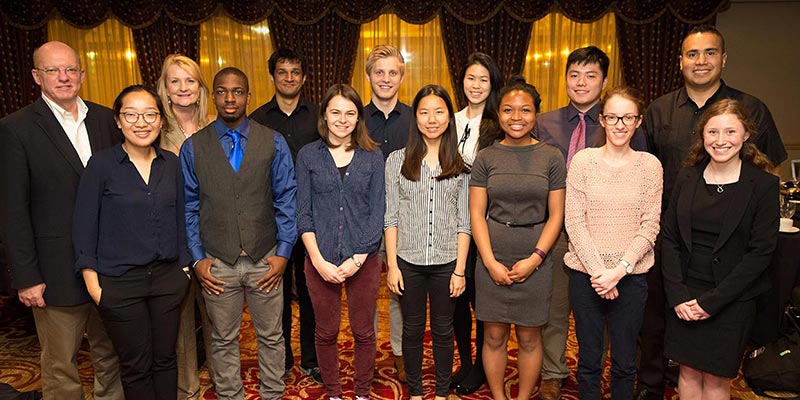
Career Development
The AACR sustains the pipeline of cancer researchers through the efforts of its Career Development Committee. Chaired by Kathleen W. Scotto, PhD, the committee provides science education for students at the high school and undergraduate levels and career development for scientists from graduate school through the junior faculty level.
High School Student Program
The AACR Special Program for High School Students enables high school students and their teachers to participate in an immersive day of learning about cancer and careers in science. Their experience includes presentations by senior researchers and cancer survivors, a networking lunch, and an opportunity to present their own research at an AACR meeting. The AACR hosted high school students at two meetings in 2016. During the AACR Annual Meeting in New Orleans, Louisiana, students were greeted by New Orleans Saints punter Thomas Morestead and Miss Arkansas USA, Abby Floyd. An additional high school program took place during the Ninth Annual AACR Conference on the Science of Cancer Health Disparities in Racial/Ethnic Minorities and the Medically Underserved in Fort Lauderdale, Florida. During the program, 100 students participated in engaging talks and competed for prizes during a Cancer Bowl hosted by session chair Beverly Lyn-Cook, PhD.
In 2016, the AACR Science Education Committee continued an innovative program initiated last year to sponsor prizes at high school regional science fairs. These prizes were awarded to bright students who showed an aptitude for science to encourage them to consider a career in cancer research.
Undergraduate Student Program
The Science Education Committee hosted its Eleventh Annual Undergraduate Student Caucus and Poster Competition at the AACR Annual Meeting 2016. More than 200 students participated in the program, and more than 100 students presented their work and competed for prizes in a poster session judged by leading AACR members. These senior scientists provided invaluable feedback and mentorship to all participants, inspiring them to consider careers in cancer science.
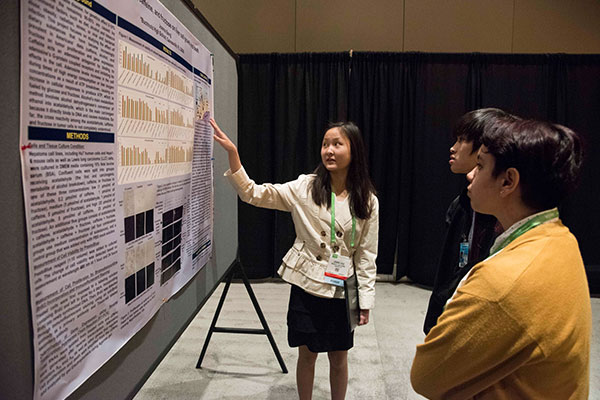
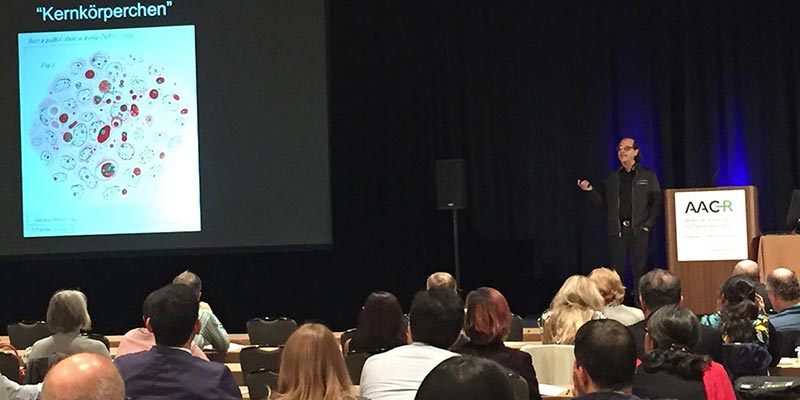
Meetings and Educational Workshops
AACR meetings and educational workshops are models of global scientific outreach. The 22 meetings and six workshops convened in 2016 harnessed the collaborative efforts of ten scientific organizations to bring the most innovative cancer science to the United States and seven other countries. These meetings reached across disciplines as well as national borders, exploring the interface between oncology and related scientific areas.
For example, the AACR conference on Engineering and Physical Sciences in Oncology, held in June 2016, explored the physical forces exerted by tumors on their microenvironment as well as ways to exploit those forces to suppress tumor progression. During the inaugural four-day conference on this high-priority subject, the AACR forged a unique collaboration between engineers, physical scientists, and cancer scientists to translate their increasing knowledge of mechanopathology into novel therapeutic approaches.
2016 Workshops
![]() Meeting Held outside U.S.
Meeting Held outside U.S.
![]() ECCO-AACR-EORTC-ESMO Methods in Clinical Cancer Research
ECCO-AACR-EORTC-ESMO Methods in Clinical Cancer Research
June 18-24; Zeist, The Netherlands
Codirectors: Corneel Coens, MSc, Christian Dittrich, MD, Lee M. Ellis, MD, and Stefan Sleijfer, MD, PhD
AACR/ASCO Methods in Clinical Cancer Research
July 23-29; Vail, Colorado
Codirectors: Patricia M. LoRusso, DO, Jyoti D. Patel, MD, and Yu Shyr, PhD
Molecular Biology in Clinical Oncology
July 24-31; Snowmass, Colorado
Director: Levi A. Garraway, MD, PhD
Codirectors: Mark W. Geraci, MD, Charles L. Sawyers, MD, FAACR, and Jean Y. Tang, MD, PhD
Integrative Molecular Epidemiology
August 5-9; Boston, Massachusetts
Director: Thomas A. Sellers, PhD, MPH
Codirectors: Peter Kraft, PhD, and Lorelei A. Mucci, ScD, MPH
![]() ACORD: Australia & Asia Pacific Clinical Oncology Research Development
ACORD: Australia & Asia Pacific Clinical Oncology Research Development
September 11-17; Magenta Shores, Australia
Steering Committee Chair: Martin R. Stockler, MBBS
Translational Cancer Research for Basic Scientists
September 18-23; Boston, Massachusetts
Course Directors: Tom Curran, PhD, FAACR, George D. Demetri, MD, and Pasi A. Jänne, MD, PhD
2016 Meetings
AACR-IASLC International Joint Conference: Lung Cancer Translational Science from the Bench to the Clinic
January 4-7; San Diego, California
Chair: Karen L. Kelly, MD, and Alice T. Shaw, MD, PhD
Cochairs: Stephen B. Baylin, MD, FAACR, Jeffrey A. Engelman, MD, PhD, Roy S. Herbst, MD, PhD, and Pierre P. Massion, MD
The Function of Tumor Microenvironment in Cancer Progression
January 7-10; San Diego, California
Cochairs: Douglas Hanahan, PhD, FAACR, Raghu Kalluri, MD, PhD, Morag Park, PhD, and Robert A. Weinberg, PhD, FAACR
Patient-Derived Cancer Models: Present and Future Applications from Basic Science to the Clinic
February 11-14; New Orleans, Louisiana
Cochairs: Hans Clevers, MD, PhD, FAACR, S. Gail Eckhardt, MD, Manuel Hidalgo, MD, PhD, and Joan Seoane, PhD
AACR-JCA Joint Conference:
Breakthroughs in Cancer Research—From Biology to Therapeutics
February 16-20; Maui, Hawaii
Cochairs: Frank McCormick, PhD, FAACR, and Tetsuo Noda, MD, PhD
Precision Medicine Series:
The Cancer Cell Cycle—Tumor Progression and Therapeutic Response
February 28-March 2; Orlando, Florida
Cochairs: J. Alan Diehl, PhD, Karen E. Knudsen, PhD, and Julien Sage, PhD
Accelerating Anticancer Agent Development and Validation Workshop
May 4-6; Bethesda, Maryland
Chair: H. Kim Lyerly, MD
Pancreatic Cancer: Advances in Science and Clinical Care
May 12-15; Orlando, Florida
Cochairs: Manuel Hidalgo, MD, PhD, Christine A. Iacobuzio-Donahue, MD, and Robert H. Vonderheide, DPhil, MD
Precision Medicine Series:
Targeting the Vulnerabilities of Cancer
May 16-19; Miami, Florida
Cochairs: Stephen W. Fesik, PhD, Jeffrey Settleman, PhD, and Paul Workman, PhD
Engineering and Physical Sciences in Oncology
June 25-28; Boston, Massachusetts
Cochairs: Joan S. Brugge, PhD, FAACR, Rakesh K. Jain, PhD, and Robert S. Langer, ScD
![]() JCA-AACR Special Joint Conference:
JCA-AACR Special Joint Conference:
The Latest Advances in Hematological Cancer Research—From Basic Science to Therapeutics
July 13-15; Urayasu, Japan
AACR Chairs: Catriona H. M. Jamieson, MD, PhD, Ross L. Levine, MD, and Jonathan D. Licht, MD
JCA Chairs: Shigeru Chiba, MD, PhD, Issay Kitabayashi, PhD, and Takuro Nakamura, MD, PhD
![]() EORTC-NCI-EMA-AACR International Conference:
EORTC-NCI-EMA-AACR International Conference:
Innovation and Biomarkers in Cancer Drug Development
September 8-9; Brussels, Belgium
Cochairs: Denis A. Lacombe, MD, and John W. Martens, PhD
Ovarian Cancer Research Symposium
September 12-13; Seattle, Washington
Cochairs: Deborah K. Armstrong, MD, Martin M. Matzuk, MD, PhD, Gordon B. Mills, MD, PhD, and Saul E. Rivkin, MD
Colorectal Cancer: From Initiation to Outcomes
September 17-20; Tampa, Florida
Cochairs: Ernest T. Hawk, MD, Steven H. Itzkowitz, MD, Kenneth W. Kinzler, PhD, FAACR, and Johanna W. Lampe, PhD, RD
The Science of Cancer Health Disparities in Racial/Ethnic Minorities and the Medically Underserved
September 25-28; Fort Lauderdale, Florida
Cochairs: Rick A. Kittles, PhD, Folakemi T. Odedina, PhD, Jeffrey N. Weitzel, MD, and Jun J. Yang, PhD
CRI-CIMT-EATI-AACR International Cancer Immunotherapy Conference:
Translating Science into Survival
September 25-28; New York, New York
Cochairs: James P. Allison, PhD, FAACR, Philip D. Greenberg, MD, Christoph Huber, MD, and Guido Kroemer, MD, PhD
Tumor Immunology and Immunotherapy
October 20-23; Boston, Massachusetts
Cochairs: James P. Allison, PhD, FAACR, Pamela S. Ohashi, PhD, Antoni Ribas, MD, PhD, and Ton Schumacher, PhD
Translational Control of Cancer: A New Frontier in Cancer Biology and Therapy
October 27-30; San Francisco, California
Cochairs: Jennifer A. Doudna, PhD, Frank McCormick, PhD, FAACR, Davide Ruggero, PhD, and Nahum Sonenberg, PhD
![]() DNA Repair: Tumor Development and Therapeutic Response
DNA Repair: Tumor Development and Therapeutic Response
November 2-5; Montreal, Quebec, Canada
Cochairs: Robert G. Bristow, MD, PhD, Maria Jasin, PhD, and Theodore S. Lawrence, MD, PhD
![]() New Horizons in Cancer Research: Delivering Cures through Cancer Science
New Horizons in Cancer Research: Delivering Cures through Cancer Science
November 2-5; Shanghai, China
Cochairs: José Baselga, MD, PhD, FAACR, and Scott A. Armstrong, MD, PhD
Improving Cancer Risk Prediction for Prevention and Early Detection
November 16-19; Orlando, Florida
Cochairs: Graham A. Colditz, MD, DrPH, Susan M. Gapstur, PhD, Kenneth R. Muir, PhD, and Mark E. Sherman, MD
![]() EORTC-NCI-AACR Molecular Targets and Cancer Therapeutics Symposium
EORTC-NCI-AACR Molecular Targets and Cancer Therapeutics Symposium
November 29-December 2; Munich, Germany
Scientific Committee Cochairs: Jean-Charles Soria, MD, PhD, Lee J. Helman, MD, and Levi A. Garraway, MD, PhD
CTRC-AACR-BCM San Antonio Breast Cancer Symposium
December 6-10; San Antonio, Texas
Codirectors: Carlos L. Arteaga, MD, FAACR, Virginia G. Kaklamani, MD, and C. Kent Osborne, MD